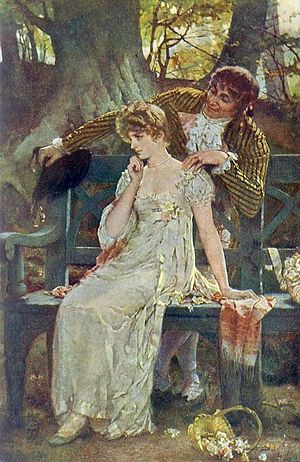| "Doubts", Henrietta Rae, 1886 (Photo credit: Wikipedia) |
In the days before the Internet, one had to expend considerable effort to obtain information. As a child around the age of 12-13, I really only had three viable options:
- Asking questions of someone I knew (e.g., a parent, friend, or teacher),
- Consulting an outdated set of encyclopedias my parents had bought several years earlier, or
- Hoping I could get a ride to the public library on the other side of town.
The encyclopedias provided some information about world religions, showing me that there were certainly alternatives to the Christian tradition in which I had been raised. However, none of them made any more sense to me. The encyclopedias might have been more helpful if I knows what I was looking for, but I had no idea at this age that atheism was even what I was looking for.
The public library to which I had access was small, located on the other side of town, and not terribly easy to use. In the days before the Internet, card catalogs were a vast collection of index cards arranged in alphabetical order. Unless one knew what one was looking for, finding books this way was tricky. When I looked up religion and Christianity, I found pro-religion and pro-Christianity material and little else. I read some of this but did not find it helpful. I had no idea that I might have better luck looking in the philosophy section, small as it was.
Turning 14 and entering high school would be a turning point. This was what would finally bring me in contact with a teacher who exposed me to Western philosophy and referred to some of the classic philosophers in class, prompting me to look for their works in the public library. It would take me a couple years, but philosophy ended up being the means through which I would discover atheism.
This was also the time in my life when I discovered a local used bookstore that was to be the place where I first learned about atheism. The store was small, dark, musty, and packed from floor to ceiling with wonderful books that were cheap enough that I could actually afford to buy some of them. Unlike the public library, they had an excellent philosophy section. I could get there by bicycle, and the owners were happy to let me browse for hours even though I never had more than $5 to spend. I still have the copy of Why I Am Not a Christian and Other Essays on Religion and Related Subjects
As I recall the effort and time, measured in years, required for me to move from doubting the faith in which I was raised to realizing that there were others out there called atheists who shared my doubts, the power of the Internet is evident. If I was 12 or 13 today, a few seconds on Google might bring me to blogs like this one where I'd quickly learn I was not alone. I'd like to think that I'm writing, at least in part, for that 13 year-old me.
